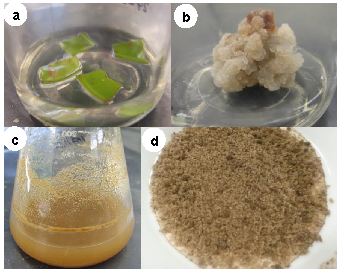 |
|
In the present work reports the establishment of a cell suspension culture (CSC) from C. brasiliense. In addition, extracts were obtained from the CSC dry biomass and leaves of wild plant using organic solvents for the purpose of determining the total phenolic (FET) and total flavonoid (FLT) content. Furthermore, it was evaluated the antioxidant and anti-inflammatory activity of the obtained extracts. For the above, a CSC was established successfully, producing a maximum of 15.2 g L-1 of dry biomass at 12 days of culture. The production of FET, FLT and antioxidant activity (DPPH or ABTS) were related with culture growth and its maximum values were produced between 12 and 16 days of culture. The results showed that CSC yielded more FET, FLT and showed higher antioxidative activity than the wild plant. The methanolic and acetone extracts from wild plant showed inhibition of the edema induced by TPA in ear mice at 2 mg/ear, with 44.49 ± 10.75 % and 27.83 ± 9.59 % of inhibition, respectively, while the dichloromethane extract of CSC showed 39.41 ± 7.74 % of inhibition at 2 mg/ear and the positive control (indomethacin) 42.30 ± 4.46 % of inhibition at 0.5 mg/ear. It is the first time that a CSC establishment of C. brasiliense has been reported and its antioxidative and anti-inflammatory activity were demonstrated. The CSC reported here can be used as a bioresource to obtain extracts or bioactive compounds.
Keywords: plant growth regulator; in vitro culture, medicinal plant, extracts, total phenolics, total flavonoids
.
|
|
 |

